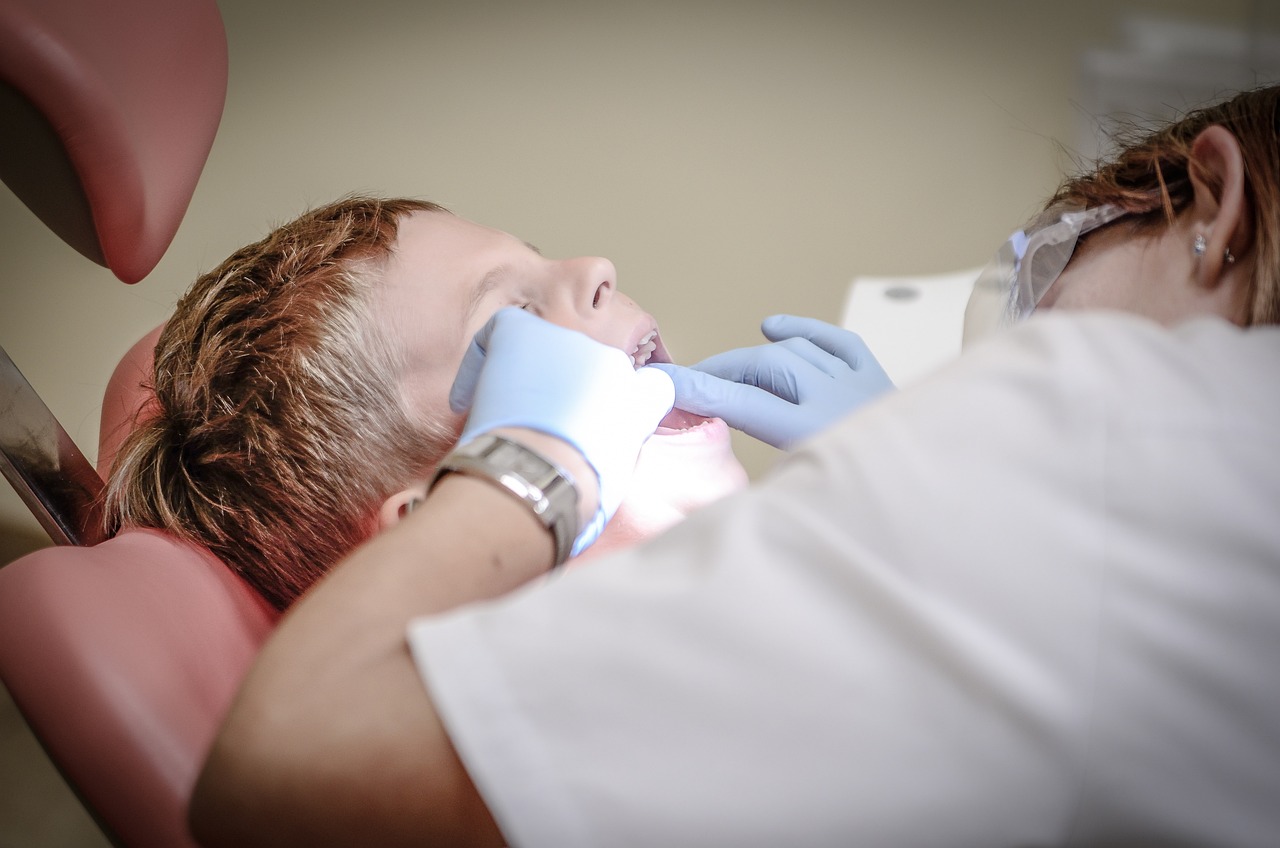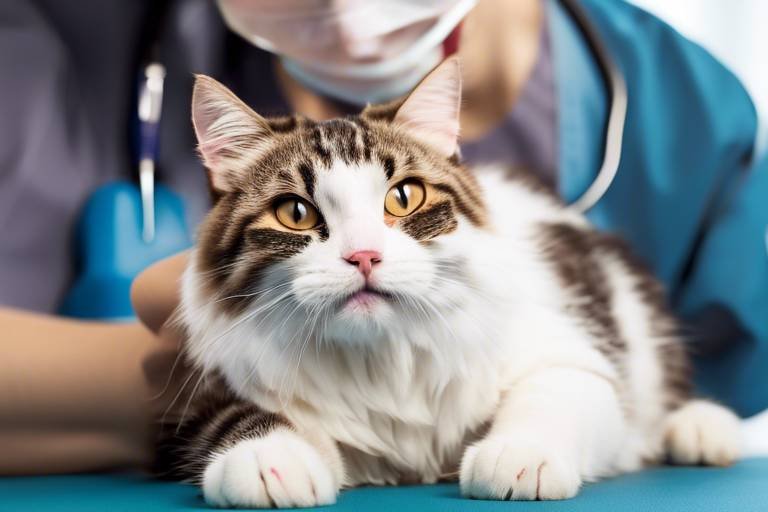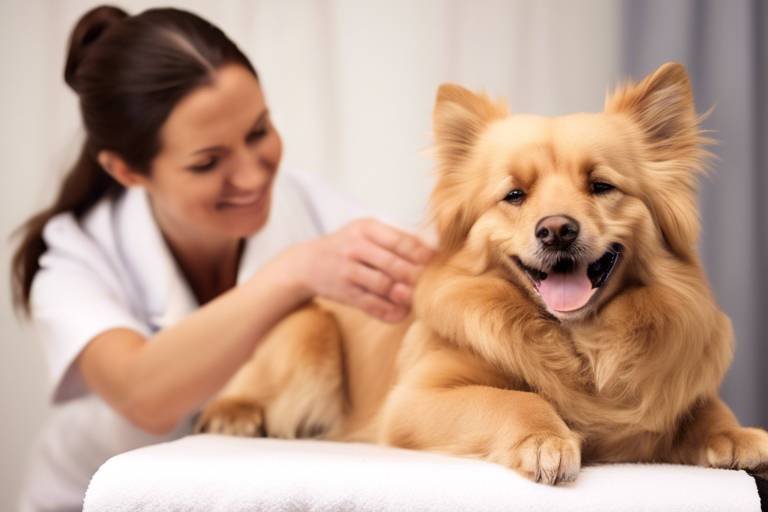Understanding Common Dental Issues in Pets
This article explores prevalent dental problems in pets, their causes, symptoms, and preventive measures, ensuring pet owners are informed about maintaining their furry friends' oral health.
Good dental hygiene is crucial for pets, as it affects their overall health. Just like humans, pets can suffer from a range of dental issues that can lead to more serious health problems if ignored. Think of your pet's mouth as a gateway to their body; if that gateway is not clean, bacteria can enter and wreak havoc. Understanding the significance of oral care can help pet owners prevent serious health issues related to dental problems. By prioritizing dental health, you are not just ensuring a bright smile but also prolonging your pet's life.
Pets often face various dental issues, including periodontal disease, tooth decay, and gingivitis. Recognizing these common problems is essential for timely treatment and maintaining your pet's oral health. Just as we might notice a toothache or sensitivity, pets can exhibit signs of discomfort that should not be overlooked. Awareness of these issues can empower pet owners to take action before minor problems escalate into major health concerns.
Periodontal disease is one of the most prevalent dental issues in pets. It results from plaque buildup and can lead to severe health complications if left untreated. Imagine a tiny army of bacteria invading your pet's mouth, slowly causing destruction. Early detection is vital for effective management. Regular check-ups can catch the signs before they turn into a full-blown invasion.
Common symptoms include:
- Bad breath
- Swollen gums
- Difficulty eating
Observing these signs can prompt timely veterinary intervention, preventing further complications and discomfort for your pet. If your pet suddenly turns their nose up at their favorite food or seems to be in pain while chewing, it’s time to consult your vet.
Treatment may involve professional dental cleanings, antibiotics, and in severe cases, tooth extraction. Regular veterinary check-ups can help manage and prevent the progression of periodontal disease. Think of it as a routine maintenance check for your car; without it, you might end up with a breakdown on the road. Early treatment can save your pet from unnecessary pain and expensive procedures down the line.
Tooth decay can occur in pets due to poor dental hygiene and diet. Just like us, pets can suffer from cavities if they indulge in too many sugary treats or neglect their dental care. Understanding the causes and symptoms of tooth decay can help pet owners take proactive steps to protect their pets' teeth. If you notice your pet has difficulty chewing or seems to be in pain, don't wait too long to seek help.
Preventive care is essential in maintaining your pet's dental health. Regular brushing, dental chews, and professional cleanings can significantly reduce the risk of dental issues and promote overall well-being. Think of preventive care as a shield that protects your furry friend from the dangers lurking in their mouth. The earlier you start, the better their chances of a healthy mouth.
Regular brushing is one of the best ways to maintain your pet's dental health. Using pet-specific toothpaste and brushes can make this routine easier and more effective for both pets and owners. It might seem like a chore at first, but once you establish a routine, it can become a bonding experience between you and your pet. Just a few minutes a week can make a world of difference in their oral hygiene.
Providing dental chews and toys can help reduce plaque buildup and keep your pet's teeth clean. Choosing appropriate products can enhance your pet's oral hygiene while providing entertainment and engagement. It’s like giving them a fun game that also benefits their health! Look for products that are specifically designed to promote dental health, ensuring that playtime is also productive.
1. How often should I brush my pet's teeth?
It’s recommended to brush your pet's teeth at least two to three times a week for optimal dental health.
2. Are dental chews effective?
Yes, dental chews can be an excellent addition to your pet's oral care routine, helping to reduce plaque and tartar buildup.
3. What signs indicate my pet may have dental issues?
Look out for bad breath, difficulty eating, swollen gums, or changes in behavior related to food. If you notice any of these signs, consult your veterinarian.
4. Can I use human toothpaste for my pet?
No, you should never use human toothpaste for pets, as it contains ingredients that can be harmful to them. Always opt for toothpaste specifically formulated for pets.

Importance of Dental Health in Pets
When it comes to our furry companions, dental health is often overlooked, yet it plays a crucial role in their overall well-being. Just like humans, pets can suffer from a variety of dental issues that can lead to serious health complications if not addressed. Poor dental hygiene can result in bacterial infections that may spread to vital organs such as the heart, liver, and kidneys. This is why understanding the significance of maintaining your pet's oral health is essential for every pet owner.
Imagine your pet's mouth as a bustling city; if the streets (teeth) are clean and well-maintained, everything runs smoothly. However, if there’s an accumulation of debris (plaque and tartar), it can lead to traffic jams (infections) that disrupt the entire system. This analogy helps highlight how crucial it is to keep your pet's mouth healthy. Regular dental care can prevent these issues and save you from costly veterinary bills down the line.
Moreover, good dental hygiene can enhance your pet's quality of life. Pets with healthy teeth and gums are more likely to enjoy their meals, engage in play, and maintain an active lifestyle. Since pets can't communicate discomfort in the same way humans do, it’s our responsibility to be vigilant. Regularly checking your pet’s mouth for signs of trouble can make a world of difference. Here are some key points to consider:
- Prevention is Better Than Cure: Regular dental care can prevent the onset of serious dental diseases.
- Cost-Effective: Investing time in dental hygiene can save you from expensive treatments later.
- Improved Quality of Life: Healthy teeth contribute to better eating habits and overall happiness.
In conclusion, prioritizing dental health in pets is not just about keeping their smiles bright; it’s about safeguarding their overall health. By incorporating regular dental care into your pet's routine, you can ensure they live a longer, healthier, and happier life.
Q: How often should I brush my pet's teeth?
A: Ideally, you should brush your pet's teeth daily, but even a few times a week can make a significant difference.
Q: Are dental chews effective?
A: Yes! Dental chews can help reduce plaque and tartar buildup, but they should be used in conjunction with regular brushing.
Q: What are the signs of dental disease in pets?
A: Common signs include bad breath, swollen gums, difficulty eating, and excessive drooling.
Q: Should I take my pet for professional dental cleanings?
A: Absolutely! Regular veterinary check-ups and professional cleanings are essential for maintaining your pet's dental health.

Common Dental Problems in Pets
When it comes to our beloved furry companions, dental health is often overlooked. However, just like humans, pets can suffer from a variety of dental issues that can significantly impact their quality of life. Understanding these common dental problems is crucial for pet owners. Let's dive into some of the most prevalent issues that can arise in our pets' mouths.
One of the most common dental problems in pets is periodontal disease. This condition starts with the buildup of plaque and tartar on the teeth, which can lead to inflammation and infection of the gums. If left untreated, periodontal disease can progress to more severe health complications, including tooth loss and even systemic issues affecting the heart and kidneys. It's alarming to think that a simple dental problem can lead to such serious health risks!
Another issue that pet owners should be aware of is tooth decay. Just like us, pets can experience cavities, especially if their diet is high in sugars or if they have poor dental hygiene practices. Tooth decay can be painful and may result in infection if not addressed promptly. Symptoms can include difficulty eating, excessive drooling, and even behavioral changes as your pet tries to cope with discomfort.
Additionally, gingivitis is a common precursor to more serious dental issues. This condition is characterized by inflammation of the gums and can be caused by a build-up of plaque. If you notice your pet's gums appearing red or swollen, it may be time to take action. Early intervention can prevent the onset of periodontal disease and save your pet from unnecessary pain.
Recognizing these dental problems early on can make all the difference. Here’s a quick overview of the common dental problems in pets:
| Dental Problem | Causes | Symptoms |
|---|---|---|
| Periodontal Disease | Plaque buildup, poor dental hygiene | Bad breath, swollen gums, difficulty eating |
| Tooth Decay | High sugar diet, lack of dental care | Pain while eating, excessive drooling |
| Gingivitis | Plaque accumulation | Red, swollen gums, bleeding |
By being aware of these issues and their symptoms, you can take proactive steps to ensure your pet's dental health. Regular veterinary check-ups and dental cleanings can help catch these problems early, allowing for timely treatment and preventing further complications.
Q: How often should I brush my pet's teeth?
A: Ideally, you should brush your pet's teeth daily. However, even a few times a week can make a significant difference in their dental health.
Q: Are dental chews effective?
A: Yes! Dental chews can help reduce plaque and tartar buildup, but they should not replace regular brushing.
Q: What are the signs that my pet may have dental problems?
A: Look for signs such as bad breath, difficulty eating, swollen gums, and excessive drooling.
Q: Can dental problems affect my pet's overall health?
A: Absolutely! Dental issues can lead to serious health complications, including heart and kidney problems.
Periodontal Disease
is a serious oral health issue that affects many pets, particularly as they age. It begins with the accumulation of plaque, a sticky film of bacteria that forms on the teeth. If not addressed, this plaque hardens into tartar, leading to inflammation of the gums, known as gingivitis. Over time, if this condition is left untreated, it can progress to periodontal disease, where the supporting structures of the teeth become compromised. This condition not only affects the mouth but can also have significant repercussions on your pet's overall health, potentially leading to heart, liver, and kidney problems.
As a pet owner, it's crucial to recognize the signs of periodontal disease early on. Some of the most common symptoms include:
- Bad breath: An unpleasant odor emanating from your pet's mouth can be one of the first indicators.
- Swollen or bleeding gums: Healthy gums should be pink and firm; any swelling or bleeding is a cause for concern.
- Difficulty eating: If your pet is hesitating to eat or showing signs of discomfort while chewing, it may be due to dental pain.
- Loose teeth: Advanced periodontal disease can lead to tooth mobility or even loss.
Understanding these symptoms can help you act swiftly. Regular dental check-ups with your veterinarian are essential, as they can identify the early stages of periodontal disease before it escalates. In fact, a study indicated that nearly 80% of dogs and 70% of cats show signs of dental disease by the age of three. This statistic underscores the importance of proactive dental care.
When it comes to treatment, addressing periodontal disease often requires a multi-faceted approach. Initially, your veterinarian may recommend:
- Professional dental cleanings: These cleanings are crucial for removing plaque and tartar buildup that regular brushing can't eliminate.
- Antibiotics: In some cases, antibiotics may be prescribed to combat infection and inflammation.
- Tooth extraction: If a tooth is severely affected, extraction may be necessary to prevent further complications.
In addition to veterinary care, maintaining a routine dental care regimen at home is vital. Regular brushing, dental treats, and toys designed to promote oral health can make a significant difference in your pet's dental hygiene. By staying vigilant and proactive, you can help your furry friend avoid the painful consequences of periodontal disease.
Q: How can I tell if my pet has periodontal disease?
A: Look for signs such as bad breath, swollen gums, difficulty eating, and loose teeth. If you notice any of these symptoms, consult your veterinarian.
Q: Can periodontal disease be prevented?
A: Yes! Regular dental care, including brushing your pet's teeth and providing dental chews, can significantly reduce the risk of periodontal disease.
Q: How often should I take my pet to the vet for dental check-ups?
A: It's recommended to have your pet's teeth checked at least once a year, but some pets may require more frequent visits based on their dental health.
Symptoms of Periodontal Disease
Recognizing the in your pet is crucial for ensuring their oral health and overall well-being. This condition often progresses silently, which means that by the time you notice something is wrong, significant damage may have already occurred. Some of the most common symptoms include:
- Bad Breath: If your pet's breath smells worse than usual, it could be a sign of underlying dental issues. This is often one of the first indicators that something is amiss.
- Swollen or Bleeding Gums: Healthy gums are typically pink and firm. If you notice any redness, swelling, or bleeding when your pet eats or when you gently touch their gums, it's time to consult a veterinarian.
- Difficulty Eating: If your pet seems to struggle with chewing or shows reluctance to eat, it may be due to pain or discomfort caused by periodontal disease.
- Loose Teeth: As periodontal disease progresses, it can lead to tooth loss. If you notice any teeth that seem loose or are missing, this is a serious sign that dental issues are present.
- Pawing at the Mouth: If your pet is frequently pawing at their mouth or face, it could indicate discomfort or pain associated with their dental health.
These symptoms can vary in intensity and may not all be present at once. It’s essential to keep an eye on your pet's behavior and oral hygiene. If you observe any of these signs, don’t hesitate to reach out to your veterinarian for an examination. Regular check-ups can help catch periodontal disease early, allowing for more effective treatment options and a better quality of life for your furry friend.
As a pet owner, you might have several questions regarding periodontal disease and dental health in pets. Here are some common inquiries:
- How often should I brush my pet's teeth? It's recommended to brush your pet's teeth at least two to three times a week to maintain good dental hygiene.
- Can dental disease affect my pet's overall health? Yes, periodontal disease can lead to serious health issues, including heart, liver, and kidney problems if bacteria from the mouth enter the bloodstream.
- What are the best dental chews for my pet? Look for dental chews that are specifically designed to promote oral health, such as those approved by veterinary dental associations.
Treatment Options for Periodontal Disease
Treating periodontal disease in pets is crucial for their overall health and well-being. When caught early, there are several effective treatment options available that can help manage the condition and prevent further complications. The treatment plan typically begins with a thorough examination by a veterinarian, who will assess the severity of the disease and recommend the best course of action.
One of the most common treatments is professional dental cleaning. This procedure involves the removal of plaque and tartar buildup from the teeth and below the gum line, which is essential for halting the progression of periodontal disease. Your veterinarian may use specialized tools to ensure a deep clean that you simply can't achieve at home. Following the cleaning, your vet may also apply fluoride treatments to help strengthen the teeth.
In some cases, antibiotics may be prescribed to combat any underlying infection associated with periodontal disease. These medications can help reduce inflammation and promote healing in the gums. It's important to follow your veterinarian's instructions regarding the dosage and duration of the antibiotic treatment to ensure its effectiveness.
For pets with severe periodontal disease, tooth extraction may be necessary. This option is usually considered when teeth are beyond saving or if they cause significant pain and discomfort. While the thought of tooth extraction can be daunting, it's essential to remember that removing problematic teeth can significantly improve your pet's quality of life.
In addition to these treatments, regular veterinary check-ups are vital. These visits allow for ongoing monitoring of your pet's dental health and enable early detection of any new issues. Your veterinarian may recommend a schedule for routine dental cleanings based on your pet's specific needs.
To summarize, here are the primary treatment options for periodontal disease:
- Professional dental cleaning
- Antibiotic therapy
- Tooth extraction (if necessary)
- Regular veterinary check-ups
Ultimately, maintaining your pet's dental health requires a combination of professional care and at-home preventive measures. By staying proactive and vigilant, you can help ensure that your furry friend enjoys a healthy mouth and a happy life.
Q: How often should I have my pet's teeth cleaned?
A: It's generally recommended to have your pet's teeth professionally cleaned at least once a year. However, some pets may require more frequent cleanings based on their individual dental health.
Q: Can I brush my pet's teeth at home?
A: Yes! Regular brushing at home is one of the best ways to maintain your pet's dental health. Make sure to use toothpaste specifically formulated for pets.
Q: Are dental chews effective for preventing periodontal disease?
A: Dental chews can help reduce plaque and tartar buildup, but they should complement regular brushing and professional cleanings rather than replace them.
Q: What signs should I look for that indicate my pet may have dental issues?
A: Common signs include bad breath, swollen gums, difficulty eating, and excessive drooling. If you notice any of these symptoms, consult your veterinarian promptly.
Tooth Decay
Tooth decay in pets is a sneaky little villain that can wreak havoc on your furry friend's smile. Just like humans, pets can suffer from cavities and other dental woes if their oral hygiene is neglected. This condition primarily arises from the accumulation of plaque, which is a sticky film of bacteria that forms on the teeth. When this plaque is not removed through regular brushing or dental care, it can harden into tartar, leading to significant dental issues. But what causes tooth decay in our beloved pets, and how can we spot it before it becomes a major problem?
One of the primary culprits behind tooth decay is poor diet. If your pet is munching on sugary treats or a diet low in essential nutrients, they're more likely to experience dental decay. Additionally, age plays a role; as pets grow older, their teeth may become more susceptible to decay due to wear and tear. It's essential to keep an eye on their eating habits and ensure they're consuming a balanced diet that supports oral health.
So, how can you tell if your pet is suffering from tooth decay? Look out for the following symptoms:
- Bad Breath: An unusual odor coming from your pet's mouth can indicate decay or other dental issues.
- Visible Discoloration: Dark spots or discoloration on the teeth can signal decay.
- Pain or Discomfort: If your pet is hesitant to eat or shows signs of pain when chewing, it could be a sign of dental problems.
- Swollen Gums: Inflammation or bleeding in the gums often accompanies tooth decay.
Recognizing these signs early can make a significant difference in treatment outcomes. If you suspect your pet may have tooth decay, it's crucial to consult your veterinarian promptly. They can perform a thorough examination and recommend the best course of action, which may include professional dental cleaning or other treatments.
Prevention is always better than cure! To keep tooth decay at bay, consider implementing a few simple strategies:
- Regularly brush your pet's teeth with pet-safe toothpaste.
- Provide dental chews that promote oral health.
- Schedule routine veterinary check-ups for professional cleanings and assessments.
By taking these proactive steps, you can help ensure that your pet maintains a healthy mouth and a joyful, pain-free life. Remember, a healthy smile is a happy smile!
Q: How often should I brush my pet's teeth?
A: Ideally, you should brush your pet's teeth daily, but aim for at least a few times a week to maintain good dental hygiene.
Q: Can I use human toothpaste on my pet?
A: No, human toothpaste contains ingredients that can be harmful to pets. Always use toothpaste specifically designed for pets.
Q: What are some signs that my pet needs a dental check-up?
A: Look for bad breath, difficulty eating, swollen gums, or any changes in behavior that might indicate dental pain.
Q: Are dental chews effective in preventing tooth decay?
A: Yes, dental chews can help reduce plaque and tartar buildup, but they should complement regular brushing and veterinary care.

Preventive Care for Dental Health
When it comes to keeping our furry companions healthy, preventive care for dental health is often overlooked, yet it plays a crucial role in their overall well-being. Just like us, pets can suffer from a variety of dental issues that stem from neglecting their oral hygiene. Fortunately, with a few simple practices, you can help your pet maintain a healthy mouth and a happy life. Imagine a world where your pet's breath is fresh, their gums are pink, and they can chew their favorite treats without pain—sounds great, right?
One of the best ways to ensure your pet's dental health is through regular brushing. This proactive approach can significantly reduce the risk of plaque buildup and subsequent dental issues. Using pet-specific toothpaste is essential, as human toothpaste can be harmful to pets. A soft-bristled toothbrush designed for pets will make the process easier. Start by introducing the toothbrush gradually; let your pet sniff it, and perhaps even taste the toothpaste. This way, they won't view it as a chore but rather as a new bonding activity with you.
In addition to brushing, incorporating dental chews and toys into your pet's routine can provide a fun and effective way to promote oral health. These products are designed to help reduce plaque and tartar buildup while also keeping your pet engaged. Look for chews that are approved by veterinary dental associations, as they are specifically formulated to support dental health. Not only do these chews help clean teeth, but they also provide mental stimulation and can keep your pet occupied for hours!
Regular veterinary check-ups are another vital component of preventive dental care. During these visits, your veterinarian can perform professional cleanings and check for any signs of dental disease that you might have missed. It’s always better to catch potential problems early, as they can escalate quickly if left untreated. Think of it as a tune-up for your pet's mouth—just like you wouldn’t skip a car maintenance check, don’t overlook your pet’s dental health!
To sum it up, here are some key preventive measures you can take to support your pet’s dental health:
- Brush your pet's teeth regularly—aim for at least two to three times a week.
- Provide dental chews and toys—these can be both fun and beneficial for oral hygiene.
- Schedule regular veterinary check-ups—professional cleanings are essential for maintaining dental health.
- Monitor your pet's diet—a balanced diet can make a significant difference in oral health.
By integrating these practices into your pet's routine, you not only help prevent dental issues but also contribute to their overall health and happiness. After all, a healthy mouth can lead to a longer, happier life for your beloved pet!
Q: How often should I brush my pet's teeth?
A: Ideally, you should brush your pet's teeth at least two to three times a week. Daily brushing is even better!
Q: Are dental chews safe for all pets?
A: Most dental chews are safe, but it’s important to choose products that are appropriate for your pet's size and chewing habits. Always supervise your pet while they enjoy these treats.
Q: What signs indicate my pet may have dental issues?
A: Common signs include bad breath, swollen gums, difficulty eating, and excessive drooling. If you notice any of these symptoms, consult your veterinarian.
Q: Can I use human toothpaste on my pet?
A: No, human toothpaste contains ingredients that can be harmful to pets. Always use toothpaste specifically formulated for pets.
Brushing Your Pet's Teeth
Brushing your pet's teeth might sound like a daunting task, but it's one of the most effective ways to ensure their dental health remains in top shape. Just like us, our furry friends can suffer from a buildup of plaque and tartar, which can lead to serious dental issues. Imagine how you feel after a long day without brushing your teeth; now think about how your pet feels! Regular brushing can prevent bad breath, gum disease, and even tooth loss.
To get started, you'll need a few essentials: a pet-specific toothbrush and toothpaste. It's crucial to use products designed for pets because human toothpaste contains ingredients that can be harmful to them. You can find a variety of flavors that appeal to your pet, making the process more enjoyable. The toothbrush should be soft-bristled and appropriately sized for your pet's mouth, whether they are a tiny Chihuahua or a large Great Dane.
When it comes to brushing, patience is key. Start by allowing your pet to sniff and taste the toothpaste. This will help them associate the experience with something positive. Gradually introduce the toothbrush by gently rubbing it along their gums and teeth. Aim for a two to three-minute brushing session to cover all the important areas, including the back teeth where plaque tends to accumulate the most. Consistency is essential, so try to make this a part of your regular routine. Ideally, you should brush your pet's teeth at least two to three times a week, if not daily.
Here’s a quick step-by-step guide to help you get started:
- Choose a quiet time when your pet is relaxed.
- Apply a small amount of pet toothpaste to the toothbrush.
- Gently lift your pet's lip and start brushing in small circular motions.
- Focus on the outer surfaces of the teeth, as this is where plaque builds up.
- Reward your pet with praise or a treat after brushing to create a positive association.
Remember, the goal is to make this experience as enjoyable as possible for your pet. If your pet resists, don't force it. Take a step back and try again later. You can also consider using dental wipes or finger brushes if a traditional toothbrush isn't working for you. The key is to find what works best for both you and your furry friend.
Incorporating teeth brushing into your pet's routine not only enhances their dental health but also strengthens the bond between you. Just like teaching a child to brush their teeth, it may take some time and patience, but the results will be well worth it. A clean mouth means a happier pet, and who doesn’t want that?
Here are some common questions pet owners have regarding brushing their pet's teeth:
- How often should I brush my pet's teeth? Ideally, you should brush your pet's teeth at least two to three times a week, but daily brushing is best for optimal dental health.
- What if my pet doesn’t like having their teeth brushed? Start slow, and try to make it a positive experience. Use treats and praise to encourage them. If they continue to resist, consult your vet for alternative dental care options.
- Can I use human toothpaste on my pet? No, human toothpaste contains ingredients that can be harmful to pets. Always use toothpaste specifically formulated for pets.
- What are the signs of dental problems in pets? Bad breath, swollen gums, difficulty eating, and excessive drooling can all be signs of dental issues. If you notice these symptoms, consult your veterinarian.
Dental Chews and Toys
When it comes to maintaining your pet's dental health, can be your best friends. Not only do they provide a fun way for your furry companions to engage with their environment, but they also serve a critical role in keeping those pearly whites clean. Imagine your pet happily gnawing on a chew while simultaneously scraping away plaque and tartar—it's a win-win situation!
Dental chews are specifically designed to promote oral health by reducing plaque buildup and freshening breath. These chews often come in various shapes and sizes, catering to different breeds and sizes of pets. The texture of the chew can help clean the teeth as your pet bites down, effectively acting like a toothbrush. It’s important to choose high-quality products that are both safe and effective, as some low-quality options may not provide the same benefits.
In addition to dental chews, there are also a variety of dental toys available that can make oral care a fun experience. These toys are typically made from durable materials designed to withstand tough chewing. Some even have added features, such as grooves or ridges, that help to clean teeth as your pet plays. It's like giving your pet a toy that doubles as a toothbrush!
Here’s a quick overview of the benefits of dental chews and toys:
- Reduces Plaque and Tartar: Chewing helps to mechanically remove plaque buildup.
- Freshens Breath: Many dental chews are infused with ingredients that combat bad breath.
- Provides Mental Stimulation: Chewing can keep your pet engaged and mentally stimulated.
- Strengthens Teeth and Gums: Chewing can promote healthier gums and stronger teeth.
However, it's essential to monitor your pet while they are enjoying their dental chews and toys. Just like with any other treat, moderation is key. Overindulgence can lead to digestive upset or even choking hazards. Always choose products that are appropriate for your pet's size and chewing habits, and consider consulting your veterinarian for recommendations tailored to your pet's specific needs.
In conclusion, incorporating dental chews and toys into your pet's routine is a simple yet effective way to enhance their oral hygiene. Just think of them as a fun and tasty addition to your pet's dental care arsenal. With the right choices, you can help ensure that your furry friend maintains a healthy mouth and a happy smile!
1. How often should I give my pet dental chews?
It's generally recommended to give dental chews a few times a week, depending on the product's instructions and your pet's chewing habits.
2. Are all dental chews safe for my pet?
Not all dental chews are created equal. Be sure to choose high-quality products that are specifically designed for your pet's size and chewing strength.
3. Can dental toys replace regular tooth brushing?
While dental toys and chews can help reduce plaque, they should not replace regular tooth brushing. A comprehensive dental care routine is essential for optimal oral health.
4. What ingredients should I look for in dental chews?
Look for dental chews that contain natural ingredients and are free from artificial additives. Ingredients like chlorophyll and baking soda can be beneficial for oral health.
Frequently Asked Questions
- What are the common signs of dental problems in pets?
Common signs include bad breath, swollen or bleeding gums, difficulty eating, and excessive drooling. If you notice any of these symptoms, it's essential to consult your veterinarian for a thorough dental check-up.
- How often should I brush my pet's teeth?
Ideally, you should brush your pet's teeth daily. However, if that's not feasible, aim for at least two to three times a week. Regular brushing helps prevent plaque buildup and keeps your pet's mouth healthy.
- Can I use human toothpaste for my pet?
No, you should never use human toothpaste for pets as it contains ingredients that can be harmful to them. Always opt for pet-specific toothpaste that is safe for their consumption.
- What are dental chews, and how do they help?
Dental chews are specially designed treats that help reduce plaque and tartar buildup while providing a satisfying chewing experience for your pet. They can be an excellent addition to your pet's dental care routine.
- How often should my pet see the vet for dental check-ups?
It's advisable to take your pet for a dental check-up at least once a year. However, pets with existing dental issues may require more frequent visits to monitor their oral health effectively.
- What should I do if my pet has periodontal disease?
If you suspect your pet has periodontal disease, schedule a veterinary appointment as soon as possible. Treatment may involve professional cleanings, antibiotics, or even surgery in severe cases.
- Are there specific breeds prone to dental issues?
Yes, certain breeds, especially small ones like Chihuahuas and Dachshunds, are more prone to dental problems due to their smaller mouths and crowded teeth. Regular dental care is crucial for these breeds.
- Can I prevent dental issues in my pet?
Absolutely! You can prevent dental issues by maintaining a regular dental care routine that includes brushing, providing dental chews, and scheduling regular veterinary check-ups. Prevention is key to keeping your pet's mouth healthy!



















